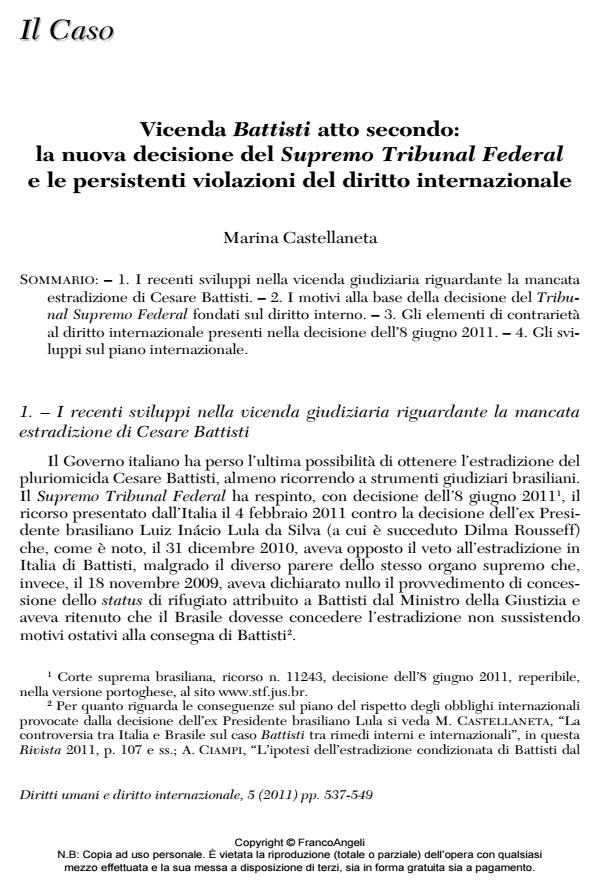Vicenda Battisti atto secondo: la nuova decisione del Supremo Tribunal Federal e le persistenti violazioni del diritto internazionale
Titolo Rivista DIRITTI UMANI E DIRITTO INTERNAZIONALE
Autori/Curatori Marina Castellaneta
Anno di pubblicazione 2011 Fascicolo 2011/3
Lingua Italiano Numero pagine 13 P. 537-549 Dimensione file 169 KB
DOI 10.3280/DUDI2011-003004
Il DOI è il codice a barre della proprietà intellettuale: per saperne di più
clicca qui
Qui sotto puoi vedere in anteprima la prima pagina di questo articolo.
Se questo articolo ti interessa, lo puoi acquistare (e scaricare in formato pdf) seguendo le facili indicazioni per acquistare il download credit. Acquista Download Credits per scaricare questo Articolo in formato PDF

FrancoAngeli è membro della Publishers International Linking Association, Inc (PILA)associazione indipendente e non profit per facilitare (attraverso i servizi tecnologici implementati da CrossRef.org) l’accesso degli studiosi ai contenuti digitali nelle pubblicazioni professionali e scientifiche
The Brazilian Supreme Court decision of 8 June 2011, which dismissed the Italian application against the decision of the former Brazilian President Luiz Inacio Lula da Silva, who had denied the extradition of Cesare Battisti in Italy, is of particular interest not only because it shows an internal contrast between political and judicial system, but mainly because it contains some statements contrary to international law. In particular, the decision, describing the act as a political act of Lula expression of state sovereignty and therefore unquestionable in domestic court, has allowed Brazil to escape to comply with the treaty obligations made by the ratification of the Treaty on bilateral extradition of 17 October 1989, despite the numerous occasions it was claimed by internal tribunal that these acts are under jurisdictional control. The decision of Lula also makes frequent recourse to the conclusions reached by the Advocate General Albuquerque Faria who recalled the risk of human rights violations against Battisti. This statement has not, however, a factual finding as there is no evidence as to the risk of persecution of Battisti in Italy. As a result, Brazil has violated the customary rule of pacta sunt servanda failing to comply with the obligations contained in the 1989 Treaty. Italy, after the ‘defeat’ on the internal level, can now apply to the International Court of Justice although it will be unlikely to achieve the delivery of Battisti
Marina Castellaneta, Vicenda <i>Battisti</i> atto secondo: la nuova decisione del <i>Supremo Tribunal Federal</i> e le persistenti violazioni del diritto internazionale in "DIRITTI UMANI E DIRITTO INTERNAZIONALE" 3/2011, pp 537-549, DOI: 10.3280/DUDI2011-003004